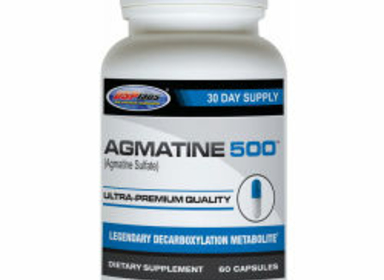 Agmatine 500 from USP labs
Agmatine is a sports supplement (agmatine sulfate), which is often presented as the most active form of the nitrogen donor arginine, but which has relatively few similarities to it when comparing its effects. In pharmacology, agmatine is presented as a nootropic that protects the brain from ischemic damage and is also promising for the treatment of neuropathic pain and drug addiction.[1] Positive effects on athletic performance and muscle growth are not directly proven, but are well established.
Discovered and named in 1910 by German scientist Albrecht Kossel, who isolated agmatine from the milk of herring.[2] Chemically speaking, it is a biogenic amine that is formed from L-arginine by decarboxylation (removal of the carboxyl group). Agmatine is also present in the human body, acting as a neurotransmitter, it is deposited in some neurons and is released when they are activated.
Agmatine 500 from USP labs
Agmatine is a sports supplement (agmatine sulfate), which is often presented as the most active form of the nitrogen donor arginine, but which has relatively few similarities to it when comparing its effects. In pharmacology, agmatine is presented as a nootropic that protects the brain from ischemic damage and is also promising for the treatment of neuropathic pain and drug addiction.[1] Positive effects on athletic performance and muscle growth are not directly proven, but are well established.
Discovered and named in 1910 by German scientist Albrecht Kossel, who isolated agmatine from the milk of herring.[2] Chemically speaking, it is a biogenic amine that is formed from L-arginine by decarboxylation (removal of the carboxyl group). Agmatine is also present in the human body, acting as a neurotransmitter, it is deposited in some neurons and is released when they are activated.
Mechanism of action
The agmatine molecule has pleiotropic (diverse) biological actions and has several proven mechanisms that may be beneficial to athletes.
Increases the activity of eNOS
NOS (nitric oxide synthase) is an enzyme that synthesizes nitric oxide. There are three types of this enzyme: iNOS (immune), nNOS (nerve), and eNOS (vascular). The first two types are inhibited by agmatine, but eNOS has been shown experimentally to increase levels and activity.[3] Nitric oxide is known to be multifunctional and is formed in many cells and tissues. In bodybuilding, only eNOS is of interest because it synthesizes nitric oxide in the blood, which leads to an expansion of the capillary bed and improved nutrition of the muscle tissue. Thus, this mechanism could theoretically facilitate nutrient and oxygen transport, promote muscle recovery, and provide pamping.
Activation of imidazoline receptors[4]
A number of studies have unequivocally proven the activation of imidazoline receptors; moreover, agmatine is an endogenous (natural) ligand of imidazoline receptors. I1-imidazoline receptor agonists include the well-known pharmacological drugs moxonidine and rilmenidine used to lower blood pressure.
When imidazoline receptors are activated, the following effects develop:[5]
suppression of the sympathetic nervous system (calming effect)
decrease in the secretion of adrenaline and other catecholamines[6]
vasodilation and reduction of blood pressure
increased secretion of the anabolic hormone insulin and improved energy supply of tissues
increase in lipolysis (fat burning)
decrease in lactic acid production
Side effects: Therapy with I1-imidazoline receptor agonists is accompanied by the development of a number of side effects, such as drowsiness or insomnia, asthenia, headache, dizziness, weakness with exercise, feelings of fear, depression, seizures, palpitations, cold extremities, orthostatic hypotension, hot flashes, dry mouth, epigastric pain, diarrhea, nausea, constipation, peripheral edema, disorders of sexual function, skin rashes, itching.
Gonadotropin (LH) concentration curve after injection
Stimulates gonadotropin and gonadoliberin secretion[7]
These two peptides are known to be able to increase the production of our own testosterone. A positive effect on gonadotropin (luteinizing hormone) and gonadorelin secretion was found only in 1995 in rats. Agmatine was injected into the ventricles of the brain. Similar results were obtained by M. Kovacs and J. Guglias in 1988 with intravenous injection of GHRG peptide with substitution of arginine for agmatine in the amino acid sequence.
Blocking of NMDA receptors[8]
This mechanism continues to be actively studied because of its importance for neuroprotection. However, it is of little interest in bodybuilding.
Endorphin release
By releasing beta-endorphin and increasing the sensitivity of opioid receptors, it has an analgesic effect. It is not addictive.
In addition, activation of serotonin and alpha2-adrenoreceptors, blocking of nicotinic receptors, activation of PI3K/Akt and adenylate cyclase were found.
As you can see from the description of the mechanisms, agmatine sulfate realizes its main action far from nitric oxide. It is only one of many mechanisms, the benefit of which is very questionable. Moreover, there is a study[9] showing that nitric oxide suppresses the synthesis of the testicular own steroid hormones (testosterone).
In spite of this, the imidazoline mechanism looks very attractive and well founded. "Caution" It is worth noting that there may be a noticeable decrease in strength and activity during training, due to the sedative action and reduction of catecholamines (although many manufacturers say otherwise, there is a supporting footnote in the mechanisms section), so the supplement may play a negative role for weight lifters, although in the pre-workout complexes this may be unnoticed due to the additional inclusion of stimulants. There is also the question of the bioavailability of agmatine sulfate, which is used in all sports supplements.
Sports nutrition
AGMATINE 500 from USP labs
Agmatine from Serious Nutrition Solutions
Hybrid N.O. by MusclePharm
Jack3d Micro (USPlabs)
Fierce Domination from SAN
Testogen-XR by Ronnie Coleman
MOAB by Muscle Warfare
Cannibal PermaSwole by Chaos & Pain
Insane Veinz from Insane Labz
Regimen of intake
It is recommended to take 500 - 1000 mg approximately 45 minutes before a workout, or any time during the day at rest along with a meal. The maximum recommended dose is 6,000 mg, according to MayoClinic.com. Can be combined with other sports nutrition. The optimal duration of intake is not clearly regulated, approximately 1-2 months.